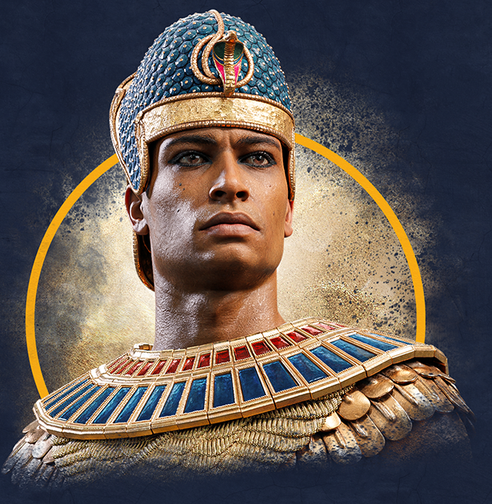Are you tired of playing Total War: Warhammer and think that most of the historical parts are too outdated? So today you can get advice about a new product that you might theoretically like. Total War: Pharaoh has arrived on the scene and we have a review for you where you will find out how this thing improves the series and what its biggest weakness is.
- Platform: PC
- Publication date: 11/10/2023
- Manufacturer: Creative Assembly
- Genre: Strategy
- Czech localization: Yes
- Multiplayer: Yes
- Download data: 40 GB
- Game time: 20 hours+
- Price: 1470 CZK (pairs)
Total War: Pharaoh’s campaign is full of historical changes
The epic campaign of the base game Total War: Pharaoh centers on the reign of Pharaoh Merenptah, and more specifically, the end of it. After all, no one can rule forever, so even this legendary man is slowly dying, which affects his empire, which feels that the balance of power is changing. The time is coming for those whose dream has always been to place a royal crown on their head. And not only them. On the borders of the empire, nomadic peoples are already waiting, who have been driven away many times in the past, and I’m not even talking about the powerful players surrounding Egypt and wanting to take a bite out of it. The Giant of the Nile is about to undergo a trial by fire, and you have the opportunity to take part in it as one of the significant historical figures who determine the direction that this civilization will take throughout history.
You can fight for dominance over the entire known world as an Egyptian, a Hittite, or a Canaanite. Yes, you are offered three completely unique playable factions, which have several leaders tied to each other, representing their culture in Total War: Pharaoh. Egypt is logically represented here the most, because the hungriest predators gather over the dying gazelle, eager to grab as much as possible. The irreconcilable Seti will try to become the successor of his father, along with whom the young nobleman Ramess, the governor of Kush-Amenmes and the cunning Tausret, who cannot be trusted even between his eyes, will enter the struggle for the throne.
If you’re not a fan of the pyramid builders, that’s okay. Under the Hittite king Shuppiluliumash and his direct son Kuranta, you have the opportunity to raze them to the ground and show the surrounding area that your empire is definitely not written off. Both factions have more or less normally functioning empires, but next to them stand the wild Canaanites, led by the aggressive Irsu and Bey, who is more of a diplomat and manipulator than a warrior. The basic cast of characters is passable in my opinion. Each then brings their own units, advantages, penalties, and buildings to the game that you won’t find in the others, making each playthrough a little unique as a result.
The campaign itself is based on the idea of observing the progress of a civilization that is slowly approaching its end. However, the end here is not something absolute, but a moment of a new beginning. During the game, you can witness civil wars, empire leadership exchanges, and desert tribe raids that are very intense. Invasions are one of the main aspects of the gameplay. Most of the game time you will have to deal with various raiders trying to destroy everything they have the strength to do. The mechanic is interesting because it means you won’t have a moment’s rest for the larger jungle. It is enough to divert attention from one province and fun is already guaranteed, because the loss of cities often has incomprehensible consequences for you.
Troy second?
If you got your hands on Total War Saga: Troy, you probably remember that instead of money, the economy was based on barter. Total War: Pharaoh is based on the same basics, so instead of regular money, you deal with food and bronze needed to maintain an army, stone and wood needed for construction, as well as gold, which, however, plays the role of an ultimate. a resource that everyone needs and can never have enough of. Once one of the sources falls out, you have real problems. It is quite difficult to feed larger armies here, for example, during Amenmesse I had quite a lot of difficulty feeding my troops, and I certainly did not get a small amount of food. Fortunately, barter exists, which is the basis of diplomacy.
It is again structured in the same way as in Total War Saga: Troy, so trade agreements are strictly based on exchange, there is no way to generate special goods and thus earn money like you need in Total War: Warhammer. In addition to negotiations, you can also implement defense contracts or non-aggression agreements through diplomacy. However, in general, foreign policy is not the most difficult element. Additionally, the AI will again often declare wars all over the game map for no logical reason, regardless of whether it knows you or not, leading to strange situations. And to make matters worse, it is impossible to negotiate with the invaders, so war is almost inevitable.
Overall, the battles in Total War: Pharaoh are decent. Yes, the artificial intelligence sometimes fails and builds completely meaningless combinations, but the set works despite the smaller size of the battalions and sometimes the enemies cause trouble, for example, during a battle in a sandstorm. I have a problem with the range of units, and this is not so much the fault of the game itself, but what era the developers chose. As in Total War Saga: Troy, you have a fairly limited selection of warriors (infantry, archers and war chariots with minimal variation), which quickly becomes boring and even boring over time, so you can only really get through the most difficult battles. In the coming months, the creators may try to solve this shortcoming with some kind of mythological expansion, as was the case with Troy, where the expansion actually did a lot.
However, I found the discussion of the need to move troops along waterways and canals very interesting. Because when they deviate, people start dying en masse, and your enormous power instantly makes you an easy target. However, there is one factor you can prevent from dying from lack of water. All you have to do is worship the right god and he will give you a chance. There are many gods in Total War: Pharaoh, and although you don’t know them at first, you will get to know them all, and it’s up to you which one you implement into your culture. Deities are a good idea and I think these are great places where you can build military bases that cover your cities with extra power, administrative buildings, and also shrines where you can pray to the gods and thus gain their favor.
Total War: Pharaoh is more of a game from the Total War saga than a full-fledged work
Another full-fledged historical part of the Total War series is already here. This time, the target of the station was Egypt and surrounding countries, which are trying to dismember the giant lying on the Nile. The main feature of this work is undoubtedly the historical campaign with specific characters, which is really interesting. I also appreciate the news in the form of constant attacks of tribes, locations and general functionality of the set. But what I’m missing here is improved diplomacy, properly functioning AI and, above all, a more diverse set of units that create unique ones from factions, where one figurine with a bow cannot be confused with the colleague standing next to it.
Basically, I don’t have much of a problem with Total War: Pharaoh being a lot like Troy. Yes, there are many similarities, but I could accept them if the price tag was more affordable. I honestly don’t think it’s fair that the developers want the same money for “Total War Saga: Pharaoh” as for a full-fledged part of the series, because this is definitely not the case. It has the qualities I mentioned above, but that doesn’t mean the price matches what the name has to offer. Over time, of course, there will be a ton of DLC content, but the question is whether it will be able to take the game beyond a simple “re-design” of Total War Saga: Troy.
Review
Total War: Pharaoh
We like
- Egypt theme
- Constant invasion of nomadic peoples
- Locations and related elements
This worries us
- Lack of major innovations
- AI hesitates
- Higher purchase price
Source :Indian TV

